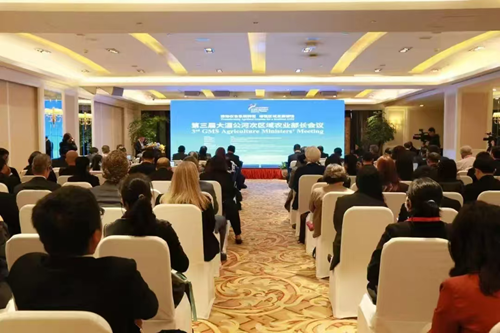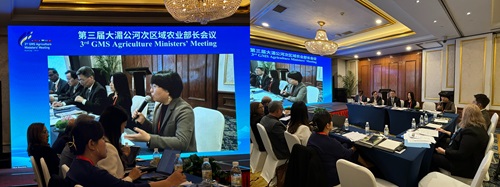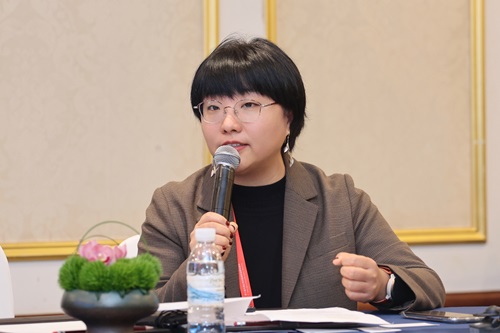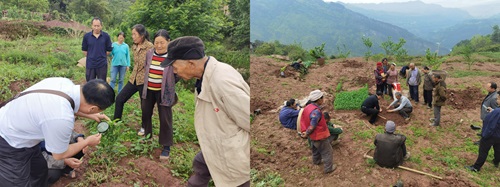Home \ Project News \ HPP was invited to participate in the 3rd GMS Agriculture Ministers' Meeting
From November 19 to 22, 2024 the Third Meeting of Ministers of Agriculture of the Greater Mekong Sub-region (GMS) was held in Kunming, Yunnan. The meeting was co-hosted by the Ministry of Agriculture and Rural Affairs, the People's Government of Yunnan and the Asian Development Bank, and adopted two documents: ‘The Kunming Strategic Framework for the Transformation of Agricultural and Food Systems in the Greater Mekong Sub-region 2030’ and ‘The Joint Ministerial Statement’.
The conference also hosted an international workshop on Climate-smart Agricultural and Food Systems in the Sub-region, 12 technical parallel sessions and the 21st meeting of the GMS Agriculture Working Group. More than 200 people, including government officials, experts, scholars, business representatives, Asian Development Bank and relevant multilateral and bilateral development partners, attended the meeting. Han Xu, HPP Senior Partnership officer was invited to speak at Session 1 ‘Development Partners' Dialogue’.

China Vice Minister of Agriculture and Rural Affairs Zhang Zhili attended the opening ceremony and delivered a speech. Zhang Zhili said that the Chinese government attaches great importance to the transformation of the agricultural food system, firmly establishes and fully practices the concept of agriculture and food, and takes multiple measures to promote high-quality agricultural development and improve food security in China and the sub-region. At present, the transformation and development of the GMS agricultural food system still faces many challenges. China is ready to work with all of you present here to earnestly implement the consensus reached at ‘The Eighth Leaders' Meeting of the Sub-regional Economic Cooperation’, strengthen policy coordination and strategic alignment, promote innovation in agricultural science and technology, deepen economic, trade and investment cooperation, and jointly improve the international environment for the transformation of the GMS agricultural food system. Foster the momentum and resilience of transformation, and work together to build a more inclusive, resilient, sustainable and competitive agricultural food system to contribute to sub-regional and global prosperity.
With the theme of "Promoting the Transformation of agricultural and food Systems and Enhancing the Resilience of Regional Development", the 12 parallel seminars brought together leaders, authoritative experts and representatives of well-known enterprises from Cambodia, China, Laos, Myanmar, Thailand, Vietnam and relevant institutions to summarize development forms, analyze development issues, discuss development paths, and form cooperation consensus to jointly promote agricultural development in the Greater Mekong Sub-region.
HPP was invited to participate in the Technical Parallel Session 1 ‘Development Partners' Dialogue’. The parallel session aimed to facilitate meaningful discussions among development partners and GMS stakeholders to enhance cooperation, align priorities and identify synergies to accelerate the transformation of agricultural food systems in the region.


Ms. Han Xu, shared HPP's work and experience with Farmers’ Clubs Projects.
Since 2008, HPP has partnered with local government departments in Yunnan and Chongqing to support rural development in southwest China, cumulatively supporting more than 11,000 small farmers. These farmers adopt environmentally friendly measures to improve their livelihoods. Farmers in the areas covered by the project identified cash crops they wanted to develop, such as black cardamom, dendrobium, bamboo rat, organic rice, etc., and farmers' incomes increased by 22-75%. These communities have adopted nearly 28 environmentally friendly measures, such as crop rotation, corn and bean intercropping, composting, solar insecticidal lamps, planting vetch as green manure, planting vetiver grass on contours to reduce soil erosion, and installing solar water heaters. In Xundian County, HPP supported the farmers to use ‘alternate wet and dry paddy rice precision planting’ and increased rice yield by 27% and reduced methane emission by 3-5 tons CO2 equivalent per hectare. Through the "Farmers Clubs" project model, HPP supports local communities to create their own livelihood development. HPP also specifically shared the impact of climate change on rural communities and advocated for the promotion of sustainable, climate-resilient agriculture.

‘We use a people to people model. We believe people can work together and help each other. We support local communities to create their own development. When people are at the center of their own development, the change can happen. In HPP we support people in the community to work together and they form ‘Farmers’ Clubs’. People could meet together in groups every month to share experience, to discuss and to get training. We use practical learning methods such as demonstration plots and study tours. Through these ways, farmers can see with their own eyes - what works, and what not.
We suggest, solutions to future-proof agrifood systems need to be decentralized, based on community-led development and adaptation actions. This might require strengthened local structures, people organized in self-help groups, increased women and youth leadership, promotion of agroforestry and climate resilient agriculture. We should experiment with bio-char, re-learn traditional knowledge, protect water sources and wetlands, etc – but it is important that there is close multi-stakeholder collaboration and a solid support network for these communities with eg. Part-time youth league members, or community entrepreneurs or extension workers supporting the village groups leading to self-organizing and cooperatives.
HPP looks forward to working with development partners to support climate-vulnerable communities, implement community-based climate adaptation actions, and promote the establishment of climate-resilient communities.